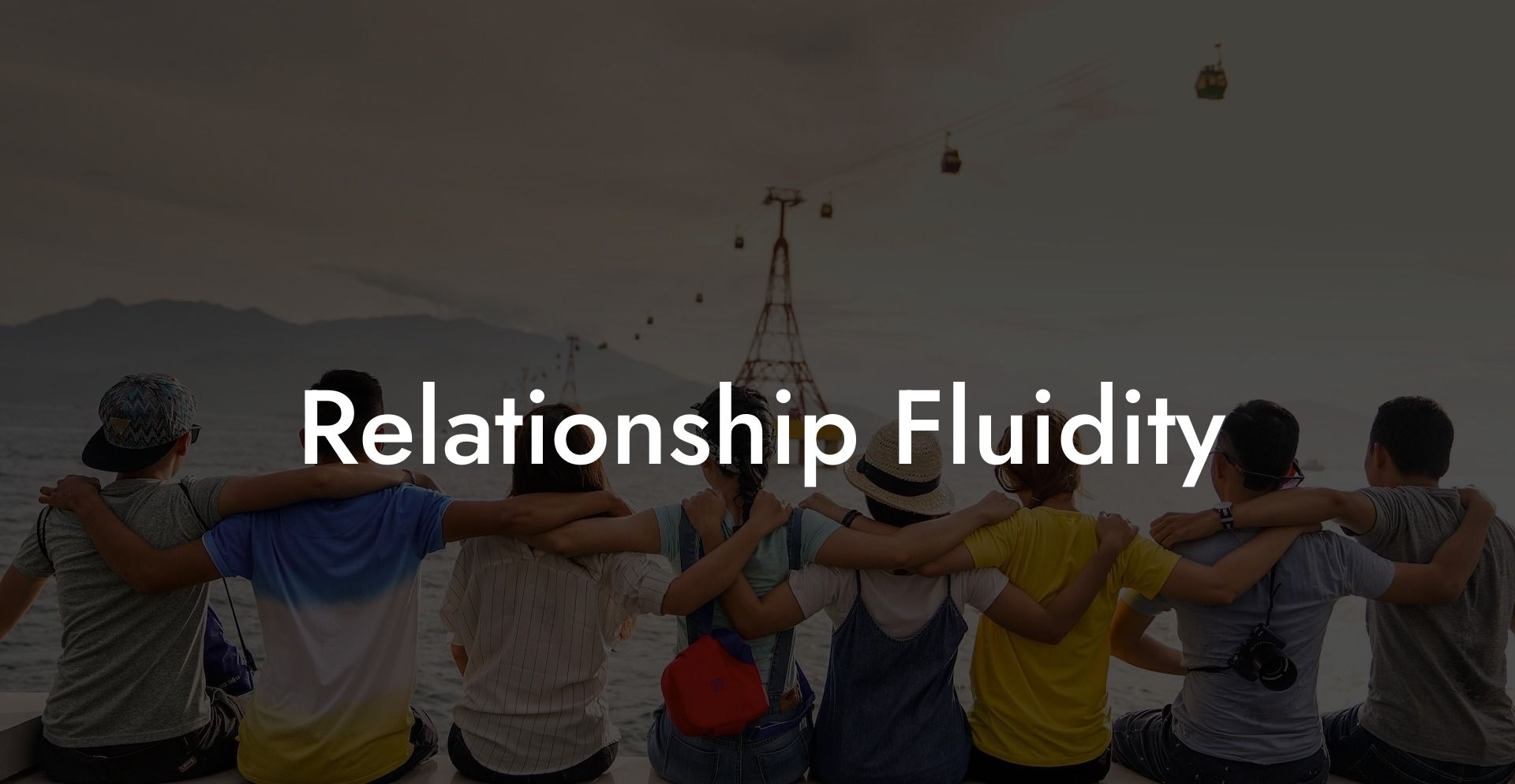Relationship Fluidity

Imagine a relationship that flows as naturally as a river, constantly changing course, adapting to obstacles, and evolving over time without losing its essential beauty. Welcome to Relationship Fluidity, a groundbreaking concept in ethical non monogamy that redefines intimacy as a dynamic, ever-evolving journey rather than a fixed, static state. In this model, your connections are not confined by rigid labels or unyielding expectations; they shift and change organically, reflecting your personal growth and the changing circumstances of your life. Get ready to dive into a framework that celebrates flexibility, continuous evolution, and the natural flow of love.
Quick Links to Useful Sections
- The Ethical Non Monogamy Term: Relationship Fluidity
- What Is Relationship Fluidity?
- Core Principles of Relationship Fluidity
- A Quick Video Explanation
- Historical and Cultural Perspectives on Relationship Fluidity
- From Rigid Roles to Dynamic Journeys
- Cultural Shifts in Modern Relationship Models
- Everyday Dynamics of Relationship Fluidity
- Embracing Change in Daily Life
- Renegotiating Boundaries in Real Time
- Balancing Stability with Fluidity
- Benefits of Embracing Relationship Fluidity
- Deeper, More Adaptive Connections
- Enhanced Personal Growth and Self-Awareness
- Improved Communication and Conflict Resolution
- Collective Resilience and Mutual Support
- Challenges of Relationship Fluidity
- Managing Emotional Uncertainty
- Balancing Individual Needs with Evolving Dynamics
- Overcoming Resistance to Change
- Navigating External Judgment
- Frequently Asked Questions (FAQ)
- Resources and Community Support: Your Next Steps
The Ethical Non Monogamy Term: Relationship Fluidity
What Is Relationship Fluidity?
Relationship Fluidity is the idea that intimate connections are inherently dynamic and adaptable. Rather than viewing relationships as permanent, unchanging contracts, this approach recognizes that the nature, intensity, and form of your bonds can evolve over time. In ethical non monogamy, Relationship Fluidity means embracing change and understanding that the way you connect with others today might be different tomorrow, and that’s perfectly okay.
This concept challenges traditional relationship paradigms by suggesting that flexibility is not a sign of instability, but a natural and healthy aspect of human connection. Whether you are experiencing passionate, intense love at one moment or enjoying a gentle, nurturing connection at another, Relationship Fluidity celebrates every phase as part of your evolving journey. It encourages open communication, continual renegotiation of boundaries, and a deep respect for each partner’s changing needs.
Core Principles of Relationship Fluidity
- Adaptability: Recognize that both you and your relationships evolve. Embrace the changes in your emotional needs, desires, and circumstances as natural progressions rather than threats.
- Open Communication: Maintain honest, ongoing dialogue with all partners to ensure that everyone’s expectations and boundaries are updated and respected.
- Flexible Boundaries: Understand that boundaries are not fixed; they are tools that can be renegotiated as your relationships and personal needs change.
- Self-Awareness: Engage in regular self-reflection to understand your emotional state and how it influences your connections.
- Mutual Empowerment: Support each other’s growth by celebrating changes and adapting together, ensuring that every shift in the relationship strengthens rather than weakens the bond.
- Embracing Uncertainty: Accept that not every moment will be perfectly clear or predictable. Learn to find comfort in the unknown and use it as an opportunity for growth.
- Inclusivity of Experience: Recognize that every type of connection, romantic, platonic, sexual, or intellectual, adds its own unique value to your overall emotional landscape.
A Quick Video Explanation

Historical and Cultural Perspectives on Relationship Fluidity
From Rigid Roles to Dynamic Journeys
For many centuries, traditional relationship models celebrated permanence and exclusivity. Monogamous partnerships were often depicted as lifelong, unchanging unions, with clearly defined roles and expectations. This static view of relationships was deeply rooted in cultural, religious, and social norms that left little room for the natural evolution of human connection.
However, as societal attitudes began to shift during the sexual revolution and subsequent progressive movements, people started to question the rigidity of these models. Early adopters of ethical non monogamy observed that relationships, much like the individuals in them, are not static. They can and do evolve over time, shifting in intensity, focus, and structure. This realization gave rise to the concept of Relationship Fluidity, which reframes change as a positive and essential element of healthy intimacy.
Cultural shifts over the past few decades have further reinforced this idea. Millennials and Gen-Z, influenced by the rapid pace of technological and social change, are increasingly drawn to relationship models that are flexible and adaptable. In today’s interconnected world, where personal growth and self-expression are highly valued, Relationship Fluidity resonates as a natural evolution of love, a recognition that intimacy can and should change as you do.
Cultural Shifts in Modern Relationship Models
In the digital age, the way we connect with others has transformed dramatically. Social media, online dating, and virtual communities have expanded our horizons and challenged conventional ideas about relationships. Many young people today view love not as a fixed state, but as an ongoing process of exploration and evolution.
Modern narratives celebrate the idea that relationships are works in progress, fluid, malleable, and capable of adapting to new circumstances. Relationship Fluidity has emerged as a powerful paradigm within ethical non monogamy, empowering individuals to embrace change, negotiate evolving boundaries, and continuously refine their understanding of what it means to be connected. This approach is not only liberating, but it also provides a realistic framework that mirrors the complexities of modern life.
Everyday Dynamics of Relationship Fluidity
Embracing Change in Daily Life
Practicing Relationship Fluidity means recognizing that every day offers a new opportunity to connect, evolve, and grow. In your daily interactions, you might find that your emotional needs shift with your mood, that a once-solid connection takes on new dimensions, or that a seemingly minor interaction sparks a profound insight.
- Daily Self-Reflection: Set aside time each day for introspection. Journaling or meditation can help you identify what you’re feeling and why, enabling you to communicate these insights to your partners.
- Regular Check-Ins: Establish routine conversations with your partners. Whether through face-to-face meetings, video calls, or group chats, regular check-ins ensure that everyone stays aligned as relationships evolve.
- Celebrating Small Shifts: Recognize and celebrate even minor changes in your relationship dynamics. Acknowledging these shifts reinforces the idea that change is natural and beneficial.
- Creative Expression: Use art, music, or other creative outlets to capture your evolving emotional landscape. These expressions can serve as both a personal reflection and a way to share your journey with others.
Renegotiating Boundaries in Real Time
One of the hallmarks of Relationship Fluidity is the continual renegotiation of boundaries. As your emotional landscape shifts, so too should the agreements that govern your interactions. This process requires open communication and a willingness to adapt.
- Feedback Sessions: Schedule regular feedback sessions with your partners to discuss what’s working and what might need adjustment. These sessions are crucial for maintaining a healthy, evolving connection.
- Dynamic Agreements: Think of your relationship agreements as living documents, flexible and adaptable to change. Update them as needed to reflect your current emotional needs.
- Clear Communication: Use "I" statements and reflective listening to ensure that your feelings and boundaries are clearly understood by all parties.
Balancing Stability with Fluidity
While change is a natural part of Relationship Fluidity, it’s important to maintain certain constants that provide a sense of security and stability. Finding this balance is key to a resilient, adaptive love life.
- Establish Core Values: Identify the core values that remain constant for you, trust, respect, and honesty, for example, and let them anchor your relationships even as other aspects evolve.
- Maintain Routine Practices: Regular check-ins, shared rituals, or consistent self-care routines can offer stability amidst the flux of emotional change.
- Flexible Yet Consistent: While your boundaries and practices may evolve, keeping some consistent elements in place helps ensure that everyone feels secure and valued.
Benefits of Embracing Relationship Fluidity
Deeper, More Adaptive Connections
Embracing Relationship Fluidity allows your connections to evolve in a way that mirrors your personal growth. As your needs change, your relationships can adapt, leading to deeper, more authentic bonds.
- Layered Intimacy: Evolving relationships create a rich tapestry of shared experiences that deepen over time.
- Increased Resilience: Adaptable relationships are better equipped to handle life’s inevitable changes, creating a robust support network.
Enhanced Personal Growth and Self-Awareness
Continuous self-reflection and adaptive relationships foster a journey of ongoing personal development. By embracing change, you gain a deeper understanding of your true self and your evolving emotional needs.
- Increased Self-Awareness: Regular introspection helps you pinpoint your evolving desires, strengths, and areas for improvement.
- Empowerment Through Change: Recognizing that growth is a continuous process reinforces your confidence in navigating life’s challenges and celebrating your unique path.
Improved Communication and Conflict Resolution
Open, honest dialogue is the foundation of Relationship Fluidity. By communicating regularly about your changing needs, you create a culture of proactive conflict resolution and mutual understanding.
- Proactive Dialogue: Regular check-ins enable you to address issues before they escalate, ensuring that conflicts are resolved constructively.
- Empathetic Engagement: Open communication fosters empathy, allowing you to better understand and support your partners’ perspectives.
Collective Resilience and Mutual Support
When relationships are fluid, the collective network becomes more resilient. Each adaptive connection contributes to a safety net that can help you and your partners navigate challenges and celebrate successes together.
- Shared Strength: A dynamic support network provides multiple layers of care, ensuring that you are never facing life’s ups and downs alone.
- Unified Growth: As each relationship evolves, the entire network benefits from collective wisdom and mutual encouragement.
Challenges of Relationship Fluidity
Managing Emotional Uncertainty
With constant change comes the challenge of managing uncertainty. The unpredictable nature of evolving relationships can sometimes lead to feelings of insecurity or confusion.
- Tip: Practice mindfulness and regular self-reflection to stay grounded and understand your emotions.
- Tip: Maintain consistent communication with your partners to ensure that everyone is informed and supported during transitions.
Balancing Individual Needs with Evolving Dynamics
As your relationships shift over time, balancing your personal needs with the changing dynamics of your connections can be challenging. It requires continuous negotiation and adaptive boundary-setting.
- Tip: Engage in open, honest dialogues with your partners about your evolving needs, and be prepared to renegotiate boundaries as necessary.
- Tip: Use "I" statements and reflective listening to ensure that your individual desires are clearly communicated and respected.
Overcoming Resistance to Change
Not everyone finds it easy to embrace continuous change. Some partners may struggle with the fluidity of emotions, leading to tension or resistance.
- Tip: Foster a culture of openness by regularly discussing the benefits of change and sharing positive experiences of growth.
- Tip: Approach resistance with empathy, and use constructive feedback to help everyone adjust to the evolving dynamics.
Navigating External Judgment
Traditional societal norms may still challenge the idea of fluid, ever-changing relationships. External criticism can sometimes lead to self-doubt or pressure to conform to more rigid models.
- Tip: Build a supportive community of like-minded individuals who celebrate adaptive, dynamic relationships.
- Tip: Focus on your personal growth and the enriched connections that come from embracing fluidity, letting external opinions take a backseat.
Frequently Asked Questions (FAQ)
1. What is Relationship Fluidity in ethical non monogamy?
Relationship Fluidity is the concept that intimate connections are dynamic and subject to change. It embraces the idea that relationships evolve naturally over time, adapting to new circumstances and personal growth.
2. How does Relationship Fluidity differ from traditional relationship models?
Traditional models often view relationships as fixed and unchanging, while Relationship Fluidity encourages continuous evolution and adaptability, allowing love to transform as your needs and experiences change.
3. What are the core principles of Relationship Fluidity?
Core principles include adaptability, open communication, flexible boundaries, self-awareness, mutual empowerment, and embracing uncertainty as part of the natural evolution of relationships.
4. How can I practice Relationship Fluidity in my daily life?
Practice by engaging in regular self-reflection, maintaining open dialogues with your partners, and being willing to renegotiate your relationship agreements as your needs evolve.
5. What benefits does Relationship Fluidity offer?
Benefits include deeper, more adaptive connections, enhanced personal growth, improved conflict resolution, and a resilient support network that evolves with you.
6. What challenges might I encounter with Relationship Fluidity?
Challenges can include managing emotional uncertainty, balancing individual needs with evolving relationship dynamics, overcoming resistance to change, and navigating external societal pressures.
7. How important is communication in maintaining Relationship Fluidity?
Communication is essential, it ensures that every change in your emotional landscape is understood, that boundaries are renegotiated, and that all partners remain aligned with your evolving needs.
8. Can Relationship Fluidity be applied to both monogamous and non monogamous relationships?
Yes, the principles of Relationship Fluidity are universal and can enhance any relationship model by promoting continuous growth and adaptive connection.
9. How do adaptive boundaries contribute to Relationship Fluidity?
Adaptive boundaries allow your relationships to evolve naturally as your emotional needs change, ensuring that your connections remain healthy, consensual, and reflective of your current self.
10. What role does self-reflection play in Relationship Fluidity?
Self-reflection is crucial, it helps you understand your evolving emotional needs, track your personal growth, and adjust your relationships to remain aligned with your authentic self.
11. How do shared experiences enhance Relationship Fluidity?
Shared experiences add depth and meaning to your connections, creating a dynamic, interconnected network that reinforces the fluid nature of your relationships.
12. Where can I find additional resources on Relationship Fluidity and ethical non monogamy?
Additional resources include books like The Ethical Slut by Dossie Easton & Janet Hardy, podcasts such as Multiamory, and online communities like r/polyamory that offer insights and guidance on embracing the evolving nature of love.
Resources and Community Support: Your Next Steps
- The Ethical Slut by Dossie Easton & Janet Hardy – A foundational text that delves into ethical non monogamy and provides practical strategies for nurturing adaptive, evolving relationships.
- Podcasts: Listen to Multiamory and similar shows for expert insights, personal stories, and creative ideas on embracing Relationship Fluidity.
- Online Communities: Join forums like r/polyamory to share experiences, ask questions, and connect with others who celebrate dynamic, fluid approaches to love.
- Workshops and Webinars: Attend events on relationship psychology, ethical non monogamy, and creative communication to deepen your understanding and expand your support network.
- Therapy and Counseling: Consider professional guidance if you need help managing complex emotions or navigating the evolving dynamics of your relationships.
By engaging with these resources and incorporating the practical strategies outlined in this guide, you can fully embrace Relationship Fluidity as a transformative approach to connection. Celebrate the dynamic evolution of your emotional life, nurture each connection with openness and adaptability, and let your relationships flow into a resilient, ever-changing tapestry of authentic, empowered love.
Lost & confused by all of the terms, types and seemingly made up 3 letter acronyms?? We've got you. Check out our Ethnical Non-Monogamy Dictionary >>
Useful Interruption: Not sure which relationship vibe fits you best? Take our Relationship Test, it’ll give you the real insight into your natural relationship style. Then, dive into our binge-worthy guides (from the tried-and-true to the “wait, that’s a thing?”) and find the perfect relationship type for your life:
- Monogamy
- Open Relationships
- Ethical Non-Monogamy
- Solo Polyamory
- Non-Hierarchical Polyamory
- Hierarchical Polyamory
- Relationship Anarchy
- Swinging
Now back to the main article but yeah take the test...












